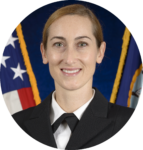WANT TO BE A NEW CHAPTER ALUMNI?
Apply online to share your accomplishments and endeavors.
APPLY TO BE FEATUREDApril 2018

Portsmouth, Virginia
Department of Urology
Naval Medical Center Portsmouth
VIEW PROFILEJanelle Fox, M.D. (PRES ’07, U ’11), completed a urology residency at Mayo Clinic in Rochester during a deferment of her military training. Since completing a fellowship in pediatric urology at Children’s Hospital in Pittsburgh, she’s served in the U.S. Navy, based out of Portsmouth, Virginia. A pediatric urologist in the Navy, you might ask? She provides pediatric urology care to military dependents at three locations in Virginia and North Carolina as well as provides general urology services. She also coordinates and teaches Navy medical students, interns and residents and is an assistant professor of pediatric urology at Eastern Virginia Medical School in Norfolk. Semper fortis.
My stepdad was enlisted in the Navy and was a boatswain’s mate aboard the USS Oriskany in Vietnam. He encouraged me to explore the military as an option to help pay for medical school.
I take care of pediatric dependents of active-duty military along with some adult active-duty or dependents while on call. There are only four pediatric urologists in the Navy and fewer than 10 in the military overall. My primary command is at Naval Medical Center in Portsmouth, Virginia. Additionally, I provide monthly pediatric urology care at Joint Base Langley-Eustis in Hampton, Virginia, and quarterly at Naval Medical Center Camp Lejeune in Jacksonville, North Carolina. Seventy-five percent of my patients are pediatric, and 25 percent are adult, largely representing active-duty and spouses with pediatric urology problems transitioning into adulthood.
Military medicine is socialized medicine. There’s never an issue of whether a family can pay, and patients do not incur substantial debt or bankruptcy, which is wonderful.
When I was a resident at Mayo Clinic, I met David Vandersteen, M.D. (PDU ’98), during rotations at his private practice in the Twin Cities. He was an incredible role model in pediatric urology, and he’d done many mission trips. Hearing him talk about the lives he’d changed made me want to have that experience. I didn’t begin to participate in medical mission trips until my fellowship but am fortunate the Navy allows me to take leave time to do so.
The pediatric urology community is relatively small — there are about 400 pediatric urologists in the U.S. and fewer than that in the rest of the world. Many in this close community do mission trips and surgical outreach to teach urologists and pediatric surgeons in other countries. Propagation of training requires us to do this. I love traveling, experiencing new cultures and fixing medical problems that could ostracize those children. I learn something on every trip, and my eyes are opened to what true pathology is possible.
Since 2012 I’ve been part of seven mission trips with IVUmed and Children’s Surgery International to Trinidad, and Senegal, Ghana and Liberia in West Africa. Approximately 500 children were served by the teams on these trips, and we taught local host surgeons surgical techniques and aftercare of surgically reconstructed patients with a goal of sustainable local pediatric urology services. It is also important to note that surgical humanitarian or mission trips require ongoing commitment from participating providers. It would be wrong to arrive in another country expecting to solve a surgical problem without risk of complications; it is critical to establish local provider relationships and follow-up plans as we would with our domestic patients.
I’ve recently started a master’s degree in health care quality and safety management through Thomas Jefferson University in Philadelphia, Pennsylvania. It’s a two-year online program that I work on at night and in my spare time. Most providers are very interested in learning how to improve the quality of care we deliver to our patients in the U.S. but, longer term, I’d like to see this effort in low- and middle-income. Did the care we provide improve quality of life? Are services adequate to manage patients should complications occur, especially when mentoring surgeons/physicians return home after humanitarian missions?
Family time is at a premium, so most of it is spent with soccer and gymnastics for my two daughters. Lily is 11, and Amy is 7, and both were born in Rochester during my residency.
My husband was a biomedical engineer, but now he stays home with our kids. That makes things easier. I’m usually only away from them for short times, so we’ve been fortunate although I see how difficult multiple deployments are on the families of children I treat. Active-duty families must have family care plans in place in the event of deployment of both parents or for single, active-duty parents.
See past New Chapter stories here.
Apply online to share your accomplishments and endeavors.
APPLY TO BE FEATURED